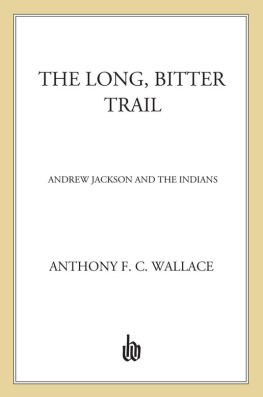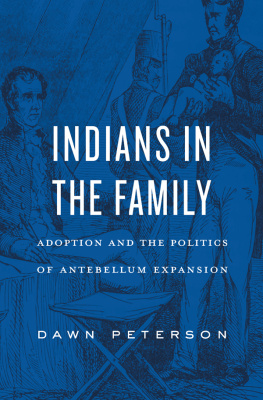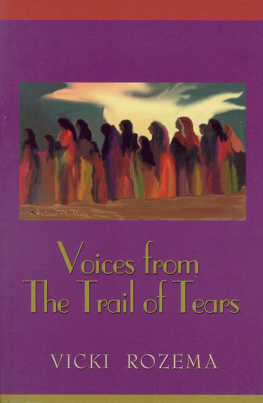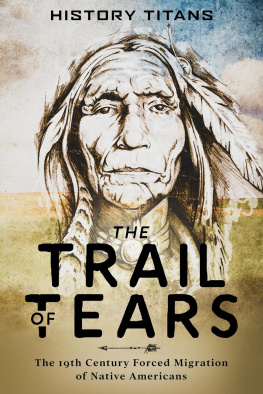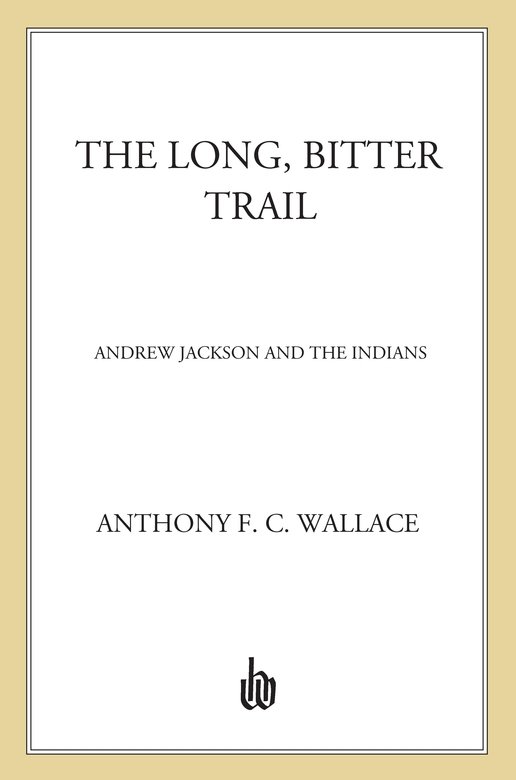EXCERPT FROM JACKSONS MESSAGE TO CONGRESS DECEMBER 8, 1829
The condition and ulterior destiny of the Indian Tribes within the limits of some of our States, have become objects of much interest and importance. It has long been the policy of Government to introduce among them the arts of civilization, in the hope of gradually reclaiming them from a wandering life. This policy has, however, been coupled with another, wholly incompatible with its success. Professing a desire to civilize and settle them, we have, at the same time, lost no opportunity to purchase their lands, and thrust them further into the wilderness. By this means they have not only been kept in a wandering state, but been led to look upon us as unjust and indifferent to their fate. Thus, though lavish in its expenditures upon the subject, Government has constantly defeated its own policy; and the Indians, in general, receding further and further to the West, have retained their savage habits. A portion, however, of the Southern tribes, having mingled much with the whites, and made some progress in the arts of civilized life, have lately attempted to erect an independent government, within the limits of Georgia and Alabama. These States, claiming to be the only Sovereigns within their territories, extended their laws over the Indians; which induced the latter to call upon the United States for protection.
Under these circumstances, the question presented was, whether the General Government had a right to sustain those people in their pretensions? The Constitution declares, that nonew State shall be formed or erected within the jurisdiction of any other State, without the consent of its legislature. If the General Government is not permitted to tolerate the erection of a confederate State within the territory of one of the members of this Union, against her consent; much less could it allow a foreign and independent government to establish itself there. Georgia became a member of the Confederacy which eventuated in our Federal Union, as a sovereign State, always asserting her claim to certain limits; which having been originally defined in her colonial charter, and subsequently recognised in the treaty of peace, she has ever since continued to enjoy, except as they have been circumscribed by her own voluntary transfer of a portion of her territory to the United States, in the articles of cession of 1802. Alabama was admitted into the Union on the same footing with the original States, with boundaries which were prescribed by Congress. There is no constitutional, conventional, or legal provision, which allows them less power over the Indians within their borders, than is possessed by Maine or New York. Would the People of Maine permit the Penobscot tribe to erect an Independent Government within their State? and unless they did, would it not be the duty of the General Government to support them in resisting such a measure? Would the People of New York permit each remnant of the Six Nations within her borders, to declare itself an independent people under the protection of the United States? Could the Indians establish a separate republic on each of their reservations in Ohio? and if they were so disposed, would it be the duty of this Government to protect them in the attempt? If the principle involved in the obvious answer to these questions be abandoned, it will follow that the objects of this Government are reversed; and that it has become a part of its duty to aid in destroying the States which it was established to protect.
Actuated by this view of the subject, I informed the Indians inhabiting parts of Georgia and Alabama, that their attempt to establish an independent government would not be countenanced by the Executive of the United States; and advised themto emigrate beyond the Mississippi, or submit to the laws of those States.
Our conduct towards these people is deeply interesting to our national character. Their present condition, contrasted with what they once were, makes a most powerful appeal to our sympathies. Our ancestors found them the uncontrolled possessors of these vast regions. By persuasion and force, they have been made to retire from river to river, and from mountain to mountain; until some of the tribes have become extinct, and others have left but remnants, to preserve, for a while, their once terrible names. Surrounded by the whites, with their arts of civilization, which, by destroying the resources of the savage, doom him to weakness and decay; the fate of the Mohegan, the Narragansett, and the Delaware, is fast overtaking the Choctaw, the Cherokee, and the Creek. That this fate surely awaits them, if they remain within the limits of the States, does not admit of a doubt. Humanity and national honor demand that every effort should be made to avert so great a calamity. It is too late to inquire whether it was just in the United States to include them and their territory within the bounds of new States whose limits they could control. That step cannot be retraced. A State cannot be dismembered by Congress, or restricted in the exercise of her constitutional power. But the people of those States, and of every State, actuated by feelings of justice and a regard for our national honor, submit to you the interesting question, whether something cannot be done, consistently with the rights of the States, to preserve this much injured race?
As a means of effecting this end, I suggest, for your consideration, the propriety of setting apart an ample district West of the Mississippi, and without the limits of any State or Territory, now formed, to be guarantied to the Indian tribes, as long as they shall occupy it: each tribe having a distinct control over the portion designated for its use. There they may be secured in the enjoyment of governments of their own choice, subject to no other control from the United States than such as may be necessary to preserve peace on the frontier, and between theseveral tribes. There the benevolent may endeavor to teach them the arts of civilization; and, by promoting union and harmony among them, to raise up an interesting commonwealth, destined to perpetuate the race, and to attest the humanity and justice of this Government.
This emigration should be voluntary: for it would be as cruel as unjust to compel the aborigines to abandon the graves of their fathers, and seek a home in a distant land. But they should be distinctly informed that, if they remain within the limits of the States, they must be subject to their laws. In return for their obedience, as individuals, they will, without doubt, be protected in the enjoyment of those possessions which they have improved by their industry. But it seems to me visionary to suppose, that, in this state of things, claims can be allowed on tracts of country on which they have neither dwelt nor made improvements, merely because they have seen them from the mountain, or passed them in the chace. Submitting to the laws of the States, and receiving, like other citizens, protection in their persons and property, they will, ere long, become merged in the mass of our population.

